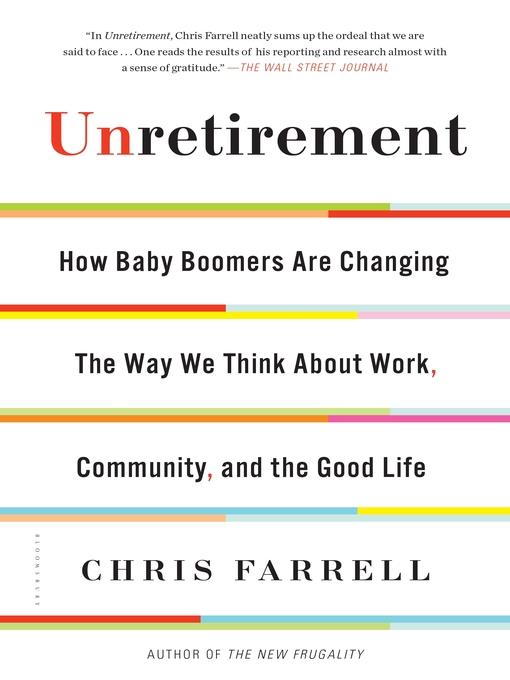
Unretirement
How Baby Boomers are Changing the Way We Think About Work, Community, and the Good Life
کتاب های مرتبط
- اطلاعات
- نقد و بررسی
- دیدگاه کاربران
نقد و بررسی

July 21, 2014
Business writer Farrell (The New Frugality), a contributing editor for Businessweek, certainly touches the zeitgeist with his latest book. Retirement is a dirty word for many older Americans, who identify strongly with work; they abhor the idea of getting old and being put out to pasture. Since Americans live longer, there is a time gap between the workplace and the grave. Mass retirement is a relatively new phenomenon, with the forever-young baby boomers now reaching the age of 65 and older. Relentlessly upbeat, Farrell stresses the wisdom and insights of age in the workplace. You won’t hear much about infirmity or dementia. Farrell urges senior “pushback” instead; a weak chapter on fighting old-age stereotypes only reinforces the book’s fragile propositions. Farrell offers sound financial advice and tips on how to navigate change, though his giddy macro-theme of “unretirement” and his would-be unretirement movement—starting new careers or entrepreneurial ventures, volunteering—seem closer to fantasy than not. However, for older workers at a loss for ideas and eager to postpone the inevitable, Farrell’s how-to-cope book will provide a comforting road map and set of possibilities. Agent: Joelle Delbourgo, Joelle Delbourgo Associates.

August 1, 2014
Bloomberg Businessweek contributing economics editor Farrell (The New Frugality: How to Consume Less, Save More and Live Better, 2009, etc.) debunks fear-ridden arguments about the graying of America leading to demographic catastrophes that will overwhelm Social Security. Retirement is a relatively new phenomenon, writes the author, and it is subject to rapid change. The elimination of a mandatory retirement age in 1986 and the accompanying redefinition of pension programs and reform of Social Security altered the rules in ways that are now feeding through on a larger scale, as "ten thousand boomers are turning sixty-five every day, a pace that will continue until 2030." Farrell contends that longer working lives, increasing productivity and the transformation of employment-from more physical to more educationally qualified-will demolish the cases of those who want to gut the safety-net programs on which more than 60 percent of Americans depend. To support his argument, the author refers to studies from the Rand Corporation, the Urban Institute and other organizations. "Fundamentally, Social Security is sound," he writes, "although it needs some tweaks to shore up its finances for the long haul." Farrell also shares the Urban Institute's view that longer working lives and higher participation rates for older workers will result in cumulative savings for Medicare over the next 30 years. An unabashed proponent of preserving Social Security without cuts, he discusses when benefits should be taken and how they should be used in seniors' financial planning. Farrell's discussions with experts from academia, finance and research foundations offer support for the view that there will be employment available to those who want it. The author showcases many progressive programs and introduces individuals from different walks of life who are contributing. A valuable contribution to an ongoing debate, with arguments and resources for specialists and general readers.
COPYRIGHT(2014) Kirkus Reviews, ALL RIGHTS RESERVED.

September 15, 2014
Are people of retirement age working longer because they want to or because they have to? According to Farrell (contributing economics editor, Bloomberg Businessweek; The New Frugality), the senior years are being reinvented as a time of unretirement. The unretirement future includes an aging workforce and elder entrepreneurship, with flexibility and variety becoming the watchwords for extending a career into the last third of life. While the author admits that unretirement is not a panacea and that the barriers are formidable, he sees this "grassroots" movement as being one that will transform career expectations at all ages. The book contains a concise history of retirement, an extensive list of resources, and the stories of seniors, both retired and working. Farrell feels that terming Social Security's future a crisis is wrong and misleading. While unretirement is being sold as a result of baby boomer mentality, only half of Americans are on track for a comfortable retirement so it may be a necessity and not a choice. VERDICT Recommended for those unsure that retirement is for them.--Bonnie Tollefson, Cleveland Bradley Cty. P.L., TN
Copyright 2014 Library Journal, LLC Used with permission.

























دیدگاه کاربران